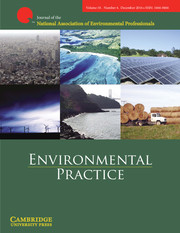Article contents
ENVIRONMENTAL REVIEWS AND CASE STUDIES: Health Risk Perception Related to Fracking in the Karoo, South Africa
Published online by Cambridge University Press: 10 February 2016
Abstract
Shale gas exploration involving hydraulic fracturing (fracking) has been on South Africa’s energy agenda since 2010 as a potential alternative to coal. Internationally, the desirability of fracking has been under debate, due to increasing evidence of associated environmental and health risks. There is limited research related to the public’s knowledge and risk perceptions of fracking, and none whatsoever from South Africa. This cross-sectional study explored, through a household survey, knowledge of, health risk perceptions of, and information sources related to fracking of 102 Central Karoo residents. Our results indicated that 40% of the participants do not know what fracking is or the potential risks and benefits thereof. The media is participants’ main information source (59.8%), and only half of the participants trust their information sources. Those with more trust in their information sources perceived fracking as posing a greater risk. Those believing fracking poses a low risk were more likely to trust the government and oil and gas companies. More than half of the participants (52.9%) believe that fracking poses an extreme health risk, and 78% think that fracking will harm their health. Despite this, 45% of the participants indicated a willingness to work in the fracking industry. The most commonly listed reasons for why fracking would make Karoo residents sick included water pollution (47.4%) and air pollution (19.6%). This study found high levels of risk uncertainty related to fracking among Central Karoo residents.
Environmental Practice 18: 53–68 (2016)
- Type
- Features
- Information
- Copyright
- © National Association of Environmental Professionals 2016
References
- 10
- Cited by


